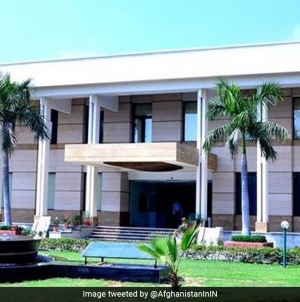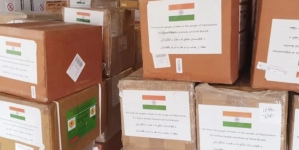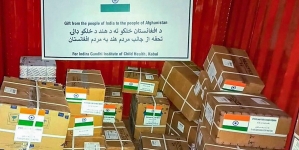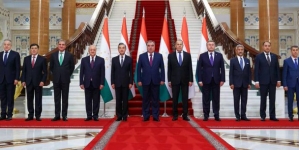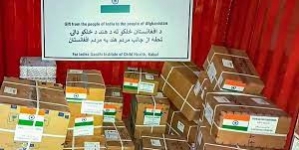-
TORONTO: Canada Sets Weekly Work Hour Limit For Indian Students At 24 - about 1 hour ago
-
TORONTO: India strongly protests ‘Khalistan’ slogans at a public event attended by Canadian leaders - 20 hours ago
-
TOKYO: Japan Offers Scholarships To Indian Students Pursuing Research - 2 days ago
-
ZAGREB: India-Croatia Foreign Office Consultations (FOC) - 2 days ago
-
BUCHAREST: Government Of Romania To Offer Scholarships To Indian Students - April 30, 2024
-
WASHINGTON: India Now Second-Largest Source Country For New Citizens In US- Report - April 30, 2024
-
LONDON: Run For Modi” Event In London To Drum Up Support For PM Modi - April 29, 2024
-
LONDON: Indian-Origin Candidate On How He Plans To Win London Mayoral Polls - April 28, 2024
-
HARVARD: No Country Is Perfect”: Physics Wallah Urges Indian Students At Harvard, Stanford To Return - April 27, 2024
-
CALIFORNIA: PM Modi Put India On World Map As Credible Innovator- IT Industry Leaders - April 26, 2024
KABUL : India to send 20,000 metric tonnes of wheat to Afghanistan via Chabahar port
KABUL : India on Tuesday announced a fresh tranche of assistance of 20,000 metric tonnes of wheat to Afghanistan.
The consignments will be sent through the Chabahar Port in Iran.
The announcement was made at the first meeting of the India-Central Asia joint working group on Afghanistan.
India said that it will extend wheat assistance to the war-torn nation in partnership with the UN World Food Programme.
Post the Taliban takeover of Afghanistan in August 2021, India announced an assistance of 50,000 metric tonnes of wheat to Afghan people as they were reeling under a severe food crisis.
Subsequently, the consignments were sent to Afghanistan using the land route through Pakistan.
Islamabad had granted the transit facility after nearly months of discussions.
“The sides took note of the current humanitarian situation and agreed to continue to provide humanitarian assistance to the Afghan people,” the statement said.
‘Afghan soil shouldn’t be used for terror’
At the meeting, India as well as five central Asian countries also asserted that Afghanistan’s soil must not be used for any terrorist activities and called for formation of a “truly inclusive” political structure in Kabul that respects rights of all Afghans including women and minorities.
A joint statement said the meeting emphasized the importance of formation of a “truly inclusive and representative political structure” that respects the rights of all Afghans and ensures equal rights of women, girls and members of minority groups, including access to education.
In December, India joined several other leading countries in criticising the Taliban’s decision to ban university education for women in Afghanistan.
The statement said the officials at the deliberations discussed regional threats of terrorism, extremism, radicalisation and drug trafficking and also deliberated on the possibilities to coordinate efforts to counter these threats.
It said they emphasised that the “territory of Afghanistan should not be used for sheltering, training, planning or financing any terrorist acts and reaffirmed that no terrorist organizations including those designated by the UNSC resolution 1267 should be provided sanctuary or allowed to use the territory of Afghanistan”.
Besides host India, the meeting was attended by special envoys or senior officials of the Kazakhstan, Kyrgyz Republic, Tajikistan, Turkmenistan and Uzbekistan. Country representatives of the UN Office on Drugs and Crimes (UNODC) and UN World Food Programme (UNWFP) also participated in the meeting.




















